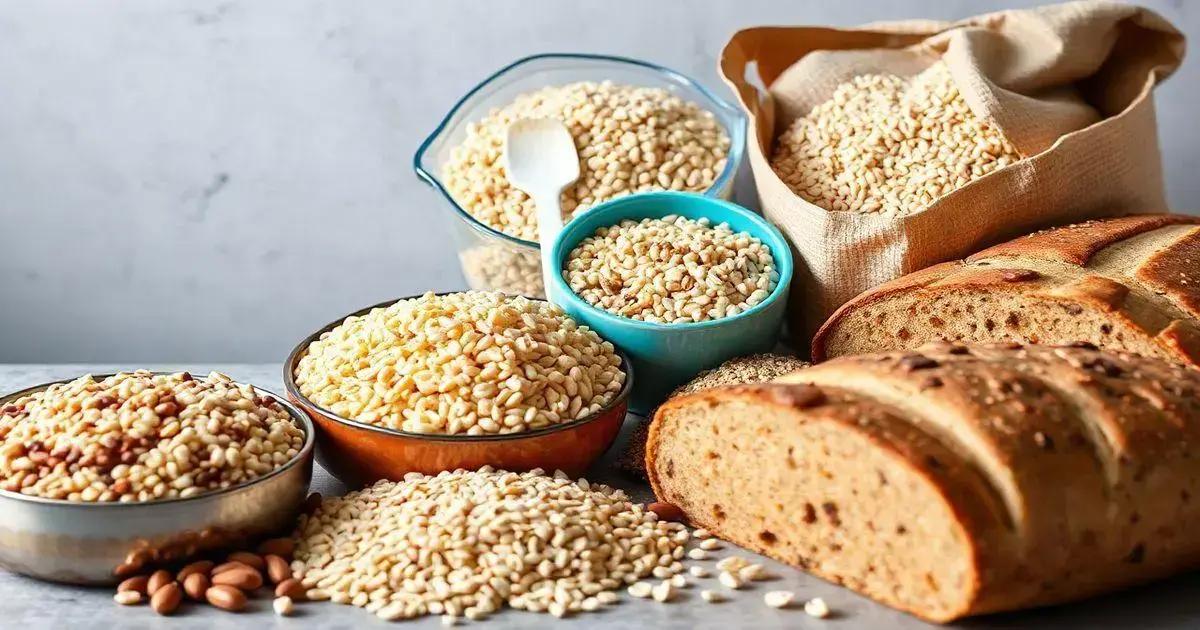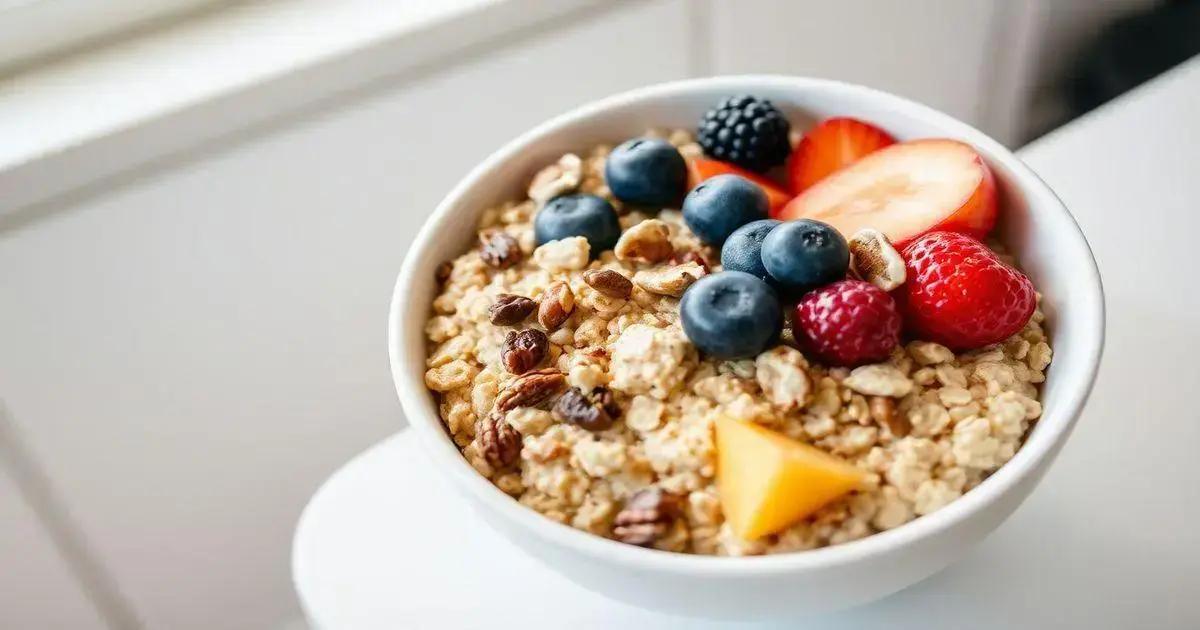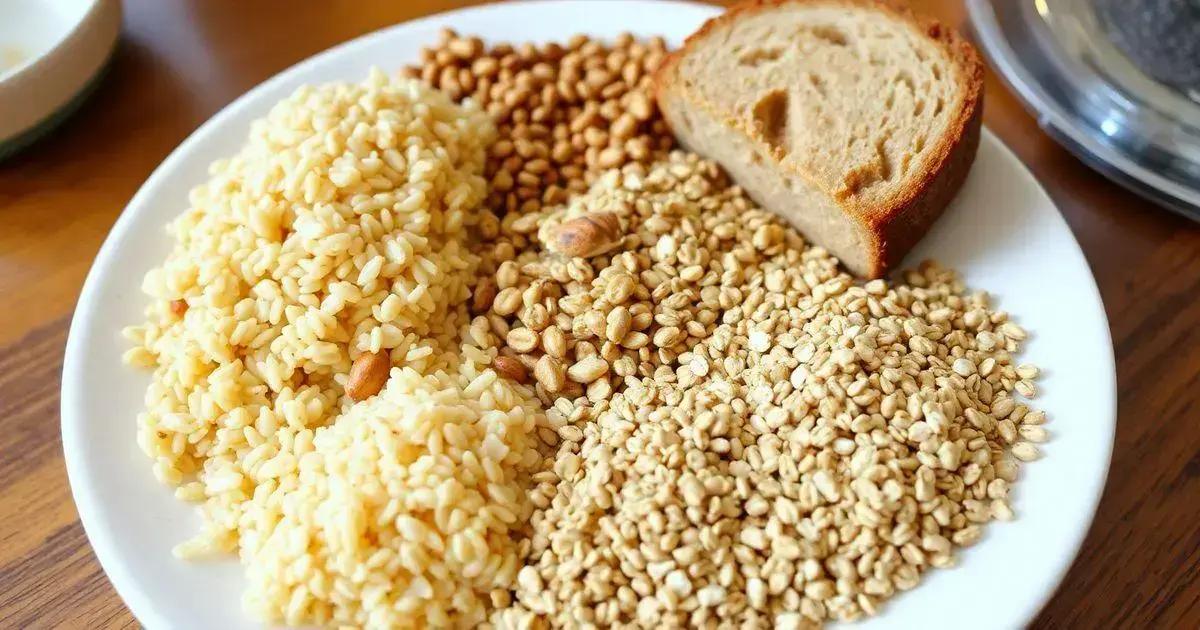The benefits of whole grains for men over 50 include improved heart health, enhanced digestive wellness, and essential nutrients that support overall vitality. Incorporating whole grains into your diet, such as oats, brown rice, and whole grain bread, can lead to significant health improvements.
If you’re a man over 50, understanding the benefits of whole grains is vital for maintaining good health. Whole grains are not only nutritious but also packed with essential vitamins and minerals that support heart health, digestion, and overall vitality. In this article, we’ll delve into the significant nutritional advantages, their impact on heart health, how they improve digestive well-being, and practical ways to incorporate them into your diet.
Nutritional Advantages of Whole Grains

Whole grains are an essential part of a healthy diet, particularly for men over 50. They offer a variety of nutritional advantages that can positively impact your overall health.
Rich in Nutrients
Whole grains are packed with vital nutrients such as fiber, vitamins, and minerals. They are an excellent source of B vitamins, including B1 (thiamine), B3 (niacin), and folate, which all play a crucial role in energy metabolism and maintaining a healthy nervous system.
High in Dietary Fiber
One of the primary benefits of whole grains is their high fiber content. Dietary fiber is important for digestive health and can help regulate blood sugar levels. This is especially beneficial for men over 50, as it aids in maintaining a healthy weight and reducing the risk of chronic diseases.
Loaded with Antioxidants
Whole grains contain antioxidants that help protect your cells from oxidative stress. This can help lower the risk of heart disease and other age-related conditions, ultimately supporting overall health as you age.
Healthy Fats
Many whole grains also include healthy fats, which are essential for brain function and heart health. Incorporating whole grains into your diet not only provides energy but also supports overall well-being.
In summary, incorporating whole grains into your daily meals can offer substantial health benefits, particularly for men over 50. By choosing whole grain products, you ensure you’re getting more nutrition compared to refined grains, which can lead to better health outcomes.
Whole Grains and Heart Health

Whole grains play a significant role in promoting heart health, especially for men over 50. As we age, maintaining cardiovascular health becomes increasingly critical.
Lowering Cholesterol Levels
Research indicates that consuming whole grains can help lower cholesterol levels. The soluble fiber found in whole grains binds with cholesterol in the intestines, aiding its removal from the body. This helps reduce the risk of heart disease, which is particularly important for aging men.
Maintaining Healthy Blood Pressure
Whole grains can also contribute to maintaining healthy blood pressure. They contain essential nutrients such as potassium and magnesium, which support blood vessel function and help regulate blood pressure levels. Regularly including whole grains in your diet can promote a healthier heart.
Reducing Inflammation
Chronic inflammation is a contributor to heart-related issues. Whole grains are rich in antioxidants and phytochemicals that can help reduce inflammation in the body. By incorporating whole grains, you can potentially lower your overall risk of heart disease.
Promoting Healthy Weight
Eating whole grains may also assist in maintaining a healthy weight. They are satiating and can help you feel full longer, reducing the need for unhealthy snacks. Keeping a healthy weight plays a vital role in preventing heart problems.
By focusing on incorporating whole grains into daily meals, men over 50 can significantly enhance their heart health and enjoy a better quality of life.
Improving Digestive Health with Whole Grains

Improving digestive health is one of the many benefits that whole grains offer, especially for men over 50. Healthy digestion is crucial for overall well-being.
Fiber for Regularity
Whole grains are rich in dietary fiber, which helps promote regular bowel movements. Fiber adds bulk to the stool, making it easier to pass. This is essential for preventing constipation, a common issue in older adults.
Healthy Gut Microbiome
Consuming whole grains also supports a healthy gut microbiome. The fiber in whole grains acts as a prebiotic, providing nourishment for beneficial gut bacteria. A balanced microbiome is vital for proper digestion and overall health.
Reducing Digestive Disorders
Studies show that a high-fiber diet, including whole grains, can help reduce the risk of developing digestive disorders, such as diverticulitis and irritable bowel syndrome (IBS). By including whole grains in your daily diet, you can support your digestive health as you age.
Staying Hydrated
Eating whole grains encourages drinking more fluids, which is important for digestive health. When you consume fiber, you should also increase your water intake to help fiber work effectively in the digestive system.
Incorporating whole grains into your meals can significantly enhance your digestive health, supporting a better quality of life for men over 50.
Incorporating Whole Grains into Your Diet

Incorporating whole grains into your diet is an effective way to improve health, especially for men over 50. Here are some simple tips.
Start Your Day Right
Begin your day with a breakfast that includes whole grains. Opt for whole grain oats or a healthy cereal that lists whole grains as the first ingredient. This will give you a nutritious start and keep you feeling full longer.
Choose Whole Grain Bread
When making sandwiches, use whole grain bread instead of white bread. Look for options labeled “100% whole grain” or “100% whole wheat”. This switch is easy and beneficial.
Incorporate Brown Rice and Quinoa
Trade white rice for brown rice or quinoa in your meals. Both are packed with nutrients and fiber, making them great substitutes in soups, stir-fries, or salads.
Snack Wisely
Replace processed snacks with whole grain options. Try **popcorn**, **whole grain crackers**, or oatmeal cookies. These snacks can help curb hunger without unnecessary additives.
Be Creative with Recipes
Get creative in the kitchen! Experiment with recipes that include whole grains. For example, add barley to soups or make a salad with farro or bulgur. These grains add texture and flavor to your meals.
By making these small changes, you can easily incorporate whole grains into your diet and enjoy their vast health benefits.
Incorporating Whole Grains for Better Health
In summary, the benefits of whole grains for men over 50 are substantial. From improving heart health to enhancing digestive wellness, whole grains provide essential nutrients that help maintain vitality as you age.
By making simple adjustments, such as choosing whole grain foods, starting meals with whole grains, and exploring diverse recipes, you can easily incorporate them into your daily diet.
Remember, embracing whole grains not only helps you feel better but also supports overall health, leading to a more active and fulfilling life.
FAQ – Frequently Asked Questions about Whole Grains and Health
What are whole grains?
Whole grains include all parts of the grain kernel—bran, germ, and endosperm. They are packed with nutrients and fiber, unlike refined grains.
Why are whole grains important for men over 50?
Whole grains help improve heart health, support digestive health, and provide essential nutrients, which are particularly beneficial for men over 50.
How can I incorporate more whole grains into my diet?
You can start your day with whole grain cereal, switch to whole grain bread, and use brown rice or quinoa in meals instead of white rice.
What are the health benefits of fiber in whole grains?
Fiber helps maintain regular bowel movements, lowers cholesterol levels, and supports a healthy gut microbiome, reducing the risk of digestive disorders.
Are there specific whole grains that are better for heart health?
Yes, whole grains such as oats, barley, and quinoa are excellent options that can help lower cholesterol and maintain healthy blood pressure.
Can whole grains help with weight management?
Indeed, whole grains are filling and can help you feel satisfied, which may reduce overall calorie intake and assist in maintaining a healthy weight.













